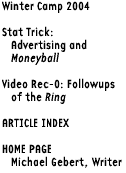


On one side of Lewis’ story are the baseball scouts: a medieval guild of ex-ballplayers and wannabes who operate entirely by instinct, bestowing their favor on kids because they look like ballplayers (or like ballplayers in the movies), and obscuring their lack of objective criteria with jargon like “He’s a tools guy” or “He has a bad body.”
And on the other side are the number-crunchers, the baseball geeks, working relentlessly to narrow down the factors that best predict which high school sluggers will make it as professional players. Beginning with the revolutionary statistician Bill James, they’ve thrown out stats that didn’t mean anything (like saves and errors, which are way too subjective), and invented new ones (like on-base percentage). But more importantly, they’ve reestablished what the point of the game is: to get a higher score than the other team.
That may seem obvious, but ask yourself—who’s a better ballplayer, the guy who hits a hundred singles or the guy who gets walked a hundred times? All of baseball’s heritage and tradition says the former is a good player and the latter is a bum, but in terms of effect on the score, they’re exactly the same. It’s not easy to get past our ideas of how something like baseball should be and accept the coldly rational view that everything that gets you one point on the scoreboard is equal—but it is. A baseball team is a machine for putting numbers on a scoreboard. How they get there is mere detail.
Now, running a baseball team with the same bloodless analytical focus that Wal-Mart brings to stocking toilet paper may seem like it takes all the romance out of a notoriously romantic sport. But look at it from the other perspective: all those players over the years who really had ability, but never got a chance because scouts valued the wrong things. As much as you may dislike some of the effects of spreadsheet management, it’s impossible to make the case that less accurate information is better—that a confused or arbitrary manager is better than one with the numbers to back what his gut tells him up. (“Baseball is a soap opera that lends itself to probabilistic thinking,” one geek says by way of explaining how the human and computer elements meet.)
It’s significant, then, that the Oakland manager who’s changing how baseball uses data wasn’t one of the overlooked—he was one of the chosen ones. Scouts identified Billy Beane as a future star, and then he spent years failing to become one. For Beane, crunching stats is a way to find out why human judgement got him so wrong.
THE ADVERTISING WORLD HAS LONG HAD A NUMBERS SIDE and a gut-instinct side —direct response religiously follows the stats, changing the background color because pale yellow sold .02% better than white, while image advertising lives or dies by the judgement and whim of humans (manager-like creative directors or bleacher bum-like focus groups) who may not know why an ad or a spot works... but know when it’s just right.
Yet if technology has even invaded baseball, it’s foolish to believe our creative departments will remain immune. Tracking, accurate numbers, accountability are the way of the world now, and every day it becomes a little more possible to know on Monday morning exactly how many sales Sunday night’s advertising produced. And as soon as it becomes possible to judge all creative by the numbers, it will become unavoidable. Like it or not, we‘ll have to accept it—because just like Billy Beane says about baseball by the numbers, “However we do it we’re never going to be more wrong than the way we did it before.”